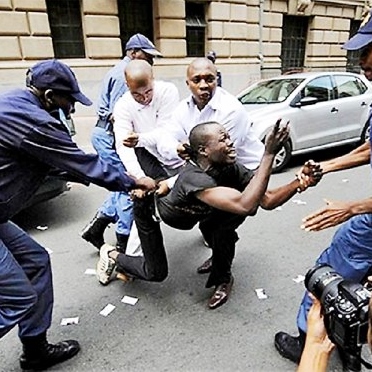click to dowload our latest edition
CLICK HERE TO SUBSCRIBE TO OUR NEWSLETTER


Published
6 years agoon
By
adminJORDAN MOSHE
However, South Africa does not have a leg to stand on when it comes to its treatment of illegal immigrants and deportation.
“There is widespread police harassment, arrest, detention and deportation,” says Professor Loren Landau, director of the African Centre for Migration and Society (ACMS) at the University of the Witwatersrand.
“The law in South Africa has remained the same since the Refugees Act of 1998. However, almost every year there have been changes to either the amendments or the regulations. Most of these have been designed to limit access to asylum adjudication, including closing offices, and to limit the grounds for application. The White Paper from last year promises an even more exclusive regime.”
Yet it is Israel which has been under the international spotlight since it announced plans to expel migrants who entered the country without permission. Israel has been told off repeatedly for its lack of sympathy and seemingly harsh measures.
Israel began handing out the first deportation orders to Africans, most of them from Sudan or Eritrea, earlier this year. It has offered a $3 500 (R42 000) grant to those who sign documents declaring they are willing to leave the country.
From next month, the Israeli government is scheduled to relocate the first of 38 000 Sudanese and Eritrean migrants who, it claims – to vociferous opposition from people inside and outside the country – entered Israel illegally, in many cases more than six years ago.
It bears noting that Israel is far from being the only democracy that sends back illegal immigrants. The US expels 400 000 illegal immigrants every year. Germany has been sending back illegal immigrants to Afghanistan – it expelled 80 000 illegal immigrants in 2017.
And South Africa is no different, having deported an average of 62 033 people a year over the past four years.
Prior to 2009, South Africa regularly deported more than 200 000 people a year, exceeding 250 000 in some years. This figure was reduced to 131 907 in 2014 and 54 169 in 2015. According to the latest report issued by the department of home affairs (DHA), a total of 23 004 people were deported in 2016.
South Africa deals with illegal immigrants in a variety of ways, explains Landau. “First is the question of who is illegal and who is undocumented. There are many people in South Africa who should have documents but don’t because the administration system doesn’t work. There are, of course, others here who are in violation of immigration laws. To some extent, the country does little about this – and many people live peacefully with their South African neighbours.”
According to South Africa’s Legal Resource Centre, when a police officer or immigration officer encounters someone they suspect to be an illegal immigrant, that person should be asked for papers proving their status. If they have no papers, they may be held at a place of detention for 48 hours while their status is determined. Most often, this is the Lindela Repatriation Centre, the only such facility in South Africa.
Based in Krugersdorp West, 40km outside of Johannesburg, the centre can accommodate 4 000 people. Definitive figures regarding the numbers of people detained at Lindela are difficult to find as the DHA doesn’t release this information publicly.
Also unreleased is the total amount of money that is spent on looking after those awaiting deportation. A 2014 study by the Institute for Security Studies and the ACMS found that R199.9 million was spent by the DHA in 2013 on deportation. Researchers of the paper confirmed that the numbers were very hard to obtain, but that the amount covered physical costs of deportation, and was separate from the R90.7 million that was spent on Lindela itself.
Moreover, the cost per resident at Lindela was found to be R99.41 per person per day, with an average stay of 30 days – or R2.97 million per thousand residents.
The same report found that in 2014, the DHA spent almost R13 million on joint deportation operations with the South African Police Service (SAPS). In 2009, SAPS Gauteng, which accounts for more than 50% of arrests leading to deportation, spent more than R362.5 million on detecting and detaining undocumented foreigners, and transferring them to Lindela.
In the past few years, Lindela has been featured in the news over allegations of ill-treatment of detainees and human rights violations. According to the ACMS investigation, various concerns have surfaced about the detention centre, including its failure to verify detainees’ immigration status, people not being notified of their rights, the correct warrants not being obtained, and people being detained beyond the legal 120 days.
Landau says: “Most people are detained for extended periods of time before being deported. Some of this is legitimate as the government must verify their identity and citizenship, and arrange with the destination country for their removal. However, many times people are detained well beyond the legally designated period because the government doesn’t have the information needed to deport and doesn’t want to release them.”
Moreover, whereas Israel has offered a financial incentive to those who are willing to leave the country, South African legislation makes provision for the DHA to ensure that those detained contribute towards the cost of their own deportation. This, in addition to the other severe laws which govern deportation in South Africa, make for a process which is costly, harsh and in need of review.
“The question for me is not whether the government is doing enough, but whether the resources required to keep a limited number of people out of the country could not be better spent on providing services and security for everyone,” says Landau
